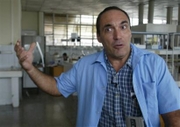Untitled Document
 |
The Cuban scientist Vicente
Verez gesture during interview with Associated Press, in his research
laboratory, Havana, Cuba, Friday, November 11, 2005. Verez who helped
develop a low-cost meningitis and pneumonia vaccine for children was denied
entry to United States to attend an awards ceremony because the State
Department would not issue him a visa. (AP Photo/Jorge Rey) |
A Cuban scientist who helped develop a low-cost synthetic vaccine that
prevents meningitis and pneumonia in small children says he was offended the
U.S. government denied his request to travel to the United States to receive
an award.
Vicente Verez-Bencomo was to accept the award recognizing his team's technological
achievement during a Wednesday ceremony at the Tech Museum of Innovation in
San Jose, Calif. He had also been invited to address a gathering of the Society
for Glycobiology in Boston on Friday.
Verez-Bencomo said the State Department denied him a visa because the visit
would be "detrimental to the interests of the United States."
"That is really offensive to me," the chemical engineer told The
Associated Press as he sat on a stool inside the University of Havana's Synthetic
Antigens Laboratory, where the vaccine was developed. "It's really a shame."
The State Department said it has a policy prohibiting comment on individual
visa cases. The switchboard rang unanswered at the U.S. Interests Section in
Havana, which evidently was closed Friday for Veterans Day.
"It's incomprehensible that a civilized nation can confuse someone who
has dedicated his life to saving the lives of children with someone who goes
against the interests of the United States," Verez-Bencomo said with a
sigh. "I wasn't going there to talk about politics, I was going to talk
about science."
Verez-Bencomo led a team that developed a vaccine for Haemophilus influenza
type B, also known as Hib, a bacteria that causes meningitis and pneumonia.
The diseases kill up to 700,000 children worldwide each year.
Before the development of a similar vaccine more than a decade ago, Hib was
the biggest cause of meningitis among infants in the United States. That earlier
vaccine has all but stamped out the disease in the western world, but mass immunizations
are too expensive for many poor countries.
The synthetic vaccine created by Verez-Bencomo's team can be produced at a
relatively low cost because antigens don't have to be grown in a bacterial culture,
making it an attractive alternative for poorer nations.
So far more than 1 million doses have been administered to Cubans. Science
Magazine last month said the vaccine "may someday save millions of lives."
Officials at the San Jose Tech Museum were disappointed the government blocked
Verez-Bencomo's trip.
The museum organizes the award ceremony every year to recognize individuals
or groups who use technology to improve the environment, economy, education,
equality and health.
"We recognized them for cutting-edge technology and wish he could be here
to accept this," museum spokesman Tony Santos said. "We wish that
hadn't been the government's decision."
An editorial in the San Jose Mercury News also expressed disappointment.
"Verez-Bencomo won't be here to receive the award," it said, "because
he's from Cuba. He's a scientist, not a terrorist, but our State Department
nevertheless denies him entry. He brings ideas, not bombs, but we let ideology
trump innovation."

